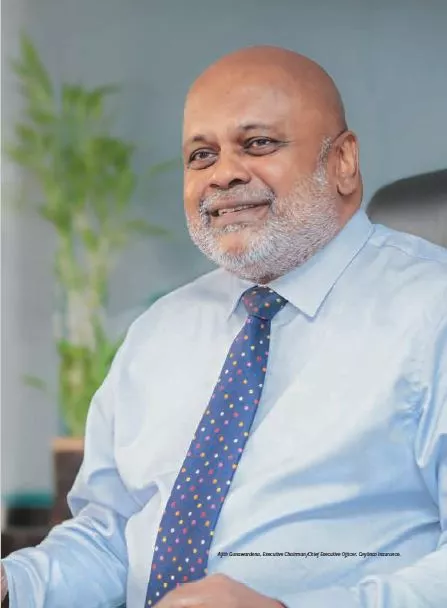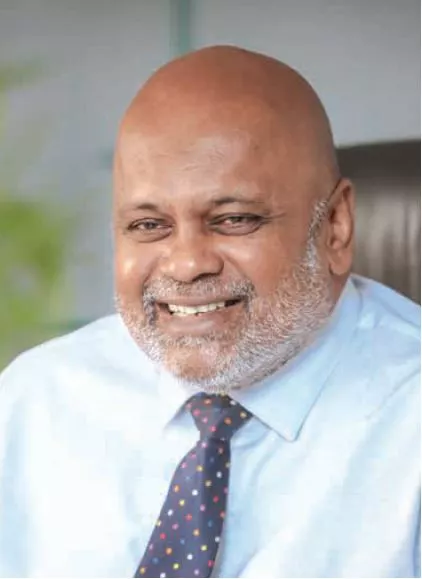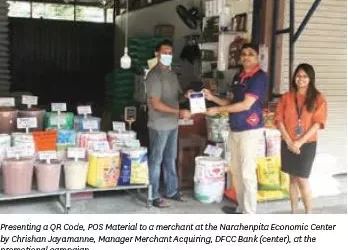
Ajith Gunawardena, Executive Chairman/Chief Executive Officer, Ceylinco Insurance.
Ajith Gunawardena, Executive Chairman/Chief Executive Officer of Ceylinco Insurance, which is the holding company for many diversified businesses, speaks about the Group’s performance, where they have continued fast growth during this challenging period. The Chairman said that Ceylinco Insurance has always focused on its staff’s welfare, as they consider the team the greatest asset to the organization. The Group sees great potential, with the pandemic being controlled effectively, in their insurance, education, power and healthcare sectors. The Chairman also stressed that a stable fiscal policy is essential for all sectors to grow and for the country to develop.
By Udeshi Amarasinghe. Assisted by Swetha Ratnajothi. Photography Menaka Aravinda.
Can you talk about the performance of Ceylinco Insurance during the past year?
There is a difference between the performance during normalcy and presently under the COVID-19 pandemic. However, I believe that we have fared well compared to many other businesses in the country. At Ceylinco General Insurance, we recorded a 1.5 percent growth in business. Usually, we would average around ten percent and above. Ceylinco Life Insurance recorded an increase of 18 percent. Companies under Ceylinco Insurance recorded revenue of 56 billion rupees with a six percent growth, where the previous years average was over ten percent. Though the insurance industry itself was not directly affected, our customers’ sectors were adversely affected, such as tourism, travel, and imports. As a result our business was also affected to a certain level. The difficulties that we faced were in collecting the premiums. Despite the challenges in managing the insurance premiums, we achieved this performance.
Our business environment was not very encouraging; still, we recorded a healthy profit. In terms of insurance, it was mainly the renewal of insurance covers that contributed to the gain. The education, power, and healthcare sectors, were not severely affected. We, however, took the opportunity to improve certain areas during this time. We are now planning for the future.
In the future, what is the potential for growth in the industry?
We hope the vaccination progresses and the number of patients affected with COVID-19 reducing over the past few days. We believe that businesses will start improving in the coming months but travel, tourism, and imports sectors to a lesser degree. But, it will be better than what it is now.
We commissioned two solar-powered projects in November 2020. From the assigned solar-powered projects to the private sector during the past year, only we completed. We have constructed one power plant in Mathugama and the other in Galle. In the education sector with ICBT Campus, we started building the new extension. The education sector is expanding, and the potential is very high. Even during this period, ICBT, ANC and Wycherly conducted online classes, zoom meetings, and various other tools that the IT sector has developed. They managed to continue with the classes and programs.
Ceylinco Life opened a branch in Nelliady in its five-storied building during the height of COVID-19. In terms of Ceylinco General Insurance, we opened 12 VIP sales outlets in 2020. We introduced the drive-through for claims for people who do not take the money on the spot because the vehicle owner is not present. We have given them the benefit of driving through and collecting their claim while being in the vehicle.
During the lockdown period, only 30-40 percent of our staff reported to work, another 30-40 percent of the people worked from home, and also there was another 20-30 percent who had no work but stayed at home. We provided transport for those who came into the office. A unique aspect of this organization is that our prime asset is our staff. We always ensure the welfare of the team.
We paid all salaries, bonuses and other allowances to all our staff without retrenching them to continue with their family life. We protect them in every form that we could, and if they fall sick, we make sure that they receive proper treatment.
We saw even the banking sector had to retrench staff. But as a whole Group, you maintained the staff numbers?
We did not retrench a single staff from any of our companies: Ceylinco General, Life, education, power, or health sectors. We had to increase the team in certain areas where salespersons were concerned; we had to increase the staff because our greatest strengths are our distribution. Today, we have over 700 branches, and we have about 2,800 permanent staff in the field together with over 4,500 consultants and agents working for Life and General. Thus, providing employment opportunities to many. With that distribution network, we manage the businesses where certain areas were operational during the lockdown and others were not. Therefore, the active branches had to balance the two.
Budget 2021 introduced many proposals for the welfare of staff. However, the Ceylinco Group has been ensuring staff welfare from the beginning. Your thoughts?
Ceylinco Insurance has been in business for the past 31 years. Throughout that entire duration, we always considered our staff our greatest asset, and we look after them well. We provide medical support for unwell staff members. We take care of all their medical bills. If the staff member has retired after 15 years of service, he/she will be eligible to receive medical support even after retirement. If a staff member passes away while in service, we continue to pay his salary to his family with a ten percent increase every year until reaching their retirement age. Furthermore, if the staff member was using a company vehicle, we will give the vehicle to the family (until the children are 18 years).
As an insurance company, we provide insurance for every staff member, but it depends on their service and position. When it comes to treatment, we still pay the expenses exceeding the insurance cover. The insurance cover is not only for the staff member but also for their immediate family. If the necessary treatment is not available in Sri Lanka, we send them overseas.

Ceylinco Group has maintained its shareholding, whereas we find many changing hands in the industry. What are your views on this?
Before the new regulations came into effect, the staff-owned two-thirds of the company. We had the Ceylinco Insurance Employee Shareholding Fund, where we gave every member of the team free shares from the junior grade to the highest level, depending on their position and the number of years in service. We have Indian, Japanese and Swiss nationalities as shareholders apart from the Sri Lankan shareholders.
Our core businesses are Life and General Insurance, but if you take the power sector, education sector, and health sector, we have 100 percent ownership. We continue to give the staff the first option to acquire shares when starting a new venture. Previously, we provided free shares, but now if we are going for a new business, we ask them to purchase them. They can obtain loans from the company. Employees become owners. That is the best that you could give them as a reward, and they become a part of the business.
If you take other insurance groups in the market, the ownership has changed not once but many times. We are one Group where the original shareholding stands. We all share the benefits.
What are your thoughts on a national insurance policy?
At Ceylinco Insurance, we have developed a national policy for all Sri Lankans at a minimal premium. If we can introduce this policy to the country, all Sri Lankans will have a health insurance policy, and the Government might not have to spend on the people’s health. We also offer an international health policy, where the insurance holder can pay 187,000 rupees per annum, and we give you a 200 million rupee cover for the year. Treatment will be covered anywhere in the world except the US and Canada. If you are unable to travel, we will arrange an air ambulance. That is the international policy that we have formulated after discussing it with various hospital and insurance providers overseas.
As mentioned, the import market is affected. What is the way forward?
If you see under General insurance, 65 percent of the market is motor. Thirty-five percent of the market size is non-motor. Therefore, 65 percent of the market is affected without imports; this includes used, reconditioned, and brand new vehicles. New and reconditioned vehicles are currently not coming into the country. Furthermore, for imports, supplier credit is required for three months. Not all suppliers will like to block their money and send their products to Sri Lanka. Today, the vehicle market is sustaining with whatever is available in the country.
The only way forward is to relax the restriction on vehicle imports and other imports, and then the general insurance market will develop. In terms of life insurance, as it is not dependent on export or imports, it can be expanded to a great extent being 100 percent local. The power, education, and health sectors do not have any restrictions. As such, we are looking at developing these areas further.

What are your thoughts on the insurance industry in general?
We have focused on IT development in our distribution, advertising, promotions, and collections in the insurance industry. With education also is the same where we have online classes and online payments. These developments in IT will be helpful once normalcy returns.
The Government should create an equal playing field in their business. All Government insurance requirements are catered to only by the state insurance provider.
Furthermore, there is a trend where some companies are giving very low premiums, which are not sustainable. We always ensure that we maintain the correct price for the premiums to provide an excellent service to our customers. The claims are guaranteed within 24 to 48 hours by us if not obtained on the spot. We can offer high-quality service because we are charging the correct premium, which is sustainable.
My personal experience, advice, and market norm from the people who understand the business is to charge the correct premium, give the service, pay the claims without hesitation, and improve the industry to a far better position. We expect everyone to go for fair, premium, and service customers in the long-term.
What is the role of the regulator?
The insurance industry is a free market. While we have a regulator, they should provide guidelines on the premiums, which is currently not happening.
How do you see the insurance industry in the future with all development work?
The insurance industry will develop with the development of the country. The life insurance market is still around 15-18 percent and will constantly develop much faster than general insurance. As such, there is much room for growth.
What is the way forward?
The economy will progress if the country has a stable fiscal policy for all sectors. We are happy that President Gotabaya Rajapaksa has provided the leadership in vaccinating the masses to control the pandemic, which will augur well for the country and the economy.





